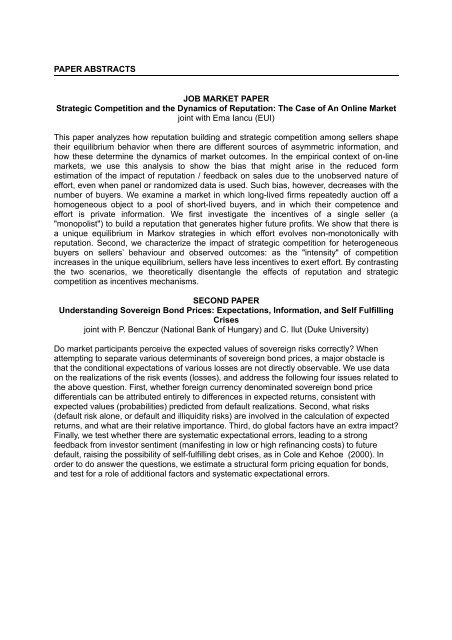View CV - European University Institute
View CV - European University Institute
View CV - European University Institute
You also want an ePaper? Increase the reach of your titles
YUMPU automatically turns print PDFs into web optimized ePapers that Google loves.
PAPER ABSTRACTS<br />
JOB MARKET PAPER<br />
Strategic Competition and the Dynamics of Reputation: The Case of An Online Market<br />
joint with Ema Iancu (EUI)<br />
This paper analyzes how reputation building and strategic competition among sellers shape<br />
their equilibrium behavior when there are different sources of asymmetric information, and<br />
how these determine the dynamics of market outcomes. In the empirical context of on-line<br />
markets, we use this analysis to show the bias that might arise in the reduced form<br />
estimation of the impact of reputation / feedback on sales due to the unobserved nature of<br />
effort, even when panel or randomized data is used. Such bias, however, decreases with the<br />
number of buyers. We examine a market in which long-lived firms repeatedly auction off a<br />
homogeneous object to a pool of short-lived buyers, and in which their competence and<br />
effort is private information. We first investigate the incentives of a single seller (a<br />
"monopolist") to build a reputation that generates higher future profits. We show that there is<br />
a unique equilibrium in Markov strategies in which effort evolves non-monotonically with<br />
reputation. Second, we characterize the impact of strategic competition for heterogeneous<br />
buyers on sellers’ behaviour and observed outcomes: as the "intensity" of competition<br />
increases in the unique equilibrium, sellers have less incentives to exert effort. By contrasting<br />
the two scenarios, we theoretically disentangle the effects of reputation and strategic<br />
competition as incentives mechanisms.<br />
SECOND PAPER<br />
Understanding Sovereign Bond Prices: Expectations, Information, and Self Fulfilling<br />
Crises<br />
joint with P. Benczur (National Bank of Hungary) and C. Ilut (Duke <strong>University</strong>)<br />
Do market participants perceive the expected values of sovereign risks correctly? When<br />
attempting to separate various determinants of sovereign bond prices, a major obstacle is<br />
that the conditional expectations of various losses are not directly observable. We use data<br />
on the realizations of the risk events (losses), and address the following four issues related to<br />
the above question. First, whether foreign currency denominated sovereign bond price<br />
differentials can be attributed entirely to differences in expected returns, consistent with<br />
expected values (probabilities) predicted from default realizations. Second, what risks<br />
(default risk alone, or default and illiquidity risks) are involved in the calculation of expected<br />
returns, and what are their relative importance. Third, do global factors have an extra impact?<br />
Finally, we test whether there are systematic expectational errors, leading to a strong<br />
feedback from investor sentiment (manifesting in low or high refinancing costs) to future<br />
default, raising the possibility of self-fulfilling debt crises, as in Cole and Kehoe (2000). In<br />
order to do answer the questions, we estimate a structural form pricing equation for bonds,<br />
and test for a role of additional factors and systematic expectational errors.

















